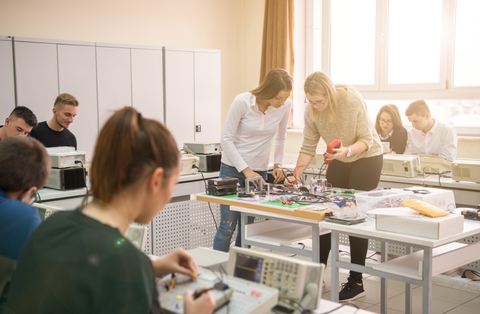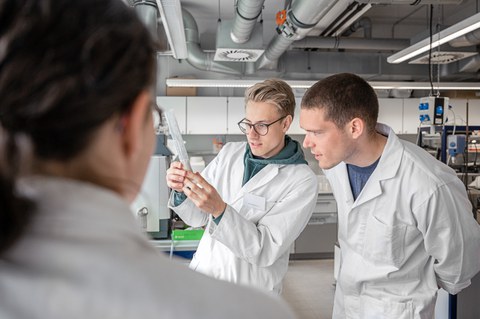Information for prospective students
As part of the Mechanical Engineering and Process Engineering and Natural Materials Technlology degree programs, students receive a solid foundation in natural and engineering sciences during the first four semesters, along with the specific fundamentals of their respective degree program. Building on this foundation, the departments of the Institute of Natural Materials Technology offer the opportunity to further specialize in five distinct fields of study during the main studies phase.
You want to know more about our fields of study?
Here you can find a general overview of the course content for the specialized fields of study offered by the institute for the main studies.
Mechanical Engineering degree program
Processing technology deals with the development of technological processes, machines and systems for the production, packaging and recycling of mass consumer goods. The aim is to find technological solutions in a dynamic field of tension between the global supply situation, ecological and economic sustainability as well as demographic and social factors.
The six semesters of the main course focus on
- Fundamentals and processes for high-quality processing of natural materials such as paper, cardboard and new types of packaging materials
- Extensive understanding of machine structures and process influences on their flexibility, reliability and efficiency while at the same time conserving resources
- Practical design aspects for the hygienic design of processes and machines
- Design, construction, simulation and project planning of processing machines and processing plants
Find out more about studying at the Chair of Processing Machines/ Processing Technology
Process Engineering and Natural Materials Technology degree program
Einblicke in das Studium Verfahrens- und Naturstofftechnik mit Vertiefung Bioverfahrenstechnik © ARD alpha Uni
The specialization course provides comprehensive knowledge and content of biotechnology and bioprocess engineering. The engineering knowledge acquired in the foundation course is expanded and combined with scientific principles from subjects such as biochemistry, biophysics and microbiology. In addition to the process engineering focus with regard to bioreaction technology and bioprocess technology, particular emphasis is placed on knowledge of modern biotechnology working techniques, which can be acquired in numerous practical courses.
The six semesters of the main course focus on:
- Bioprocess engineering, bioreaction engineering and bioprocess engineering
- Biochemistry and biophysics
- Microbiology and cell biology
- Genetic engineering and molecular biology
- Engineering sciences
Find out more about studying at the Chair of Bioprocess Engineering
In the main course, students acquire comprehensive knowledge of all aspects of wood technology and fiber materials technology, including paper technology. In addition to the fundamentals of wood chemistry and wood anatomy, important processes for the production and processing of wood and fiber materials are taught. The special proximity to mechanical engineering is also taken into account through a corresponding range of courses.
The six semesters of the main course focus on
- Wood and fiber material production and processing
- Wood chemistry, wood physics and paper physics as well as wood anatomy
- Design and manufacture of products
- Coating and bonding technology, machining technology, wood tempering
- Paper production and processing technology
- Technology of processing plastics and fiber composites
Find out more about studying at the Chair of Wood Technology and Fiber Materials Technology
In food engineering, engineers plan, monitor and optimize processes that are required for the production of food . They develop modern, innovative products that serve global sustainability goals, taking into account the special properties of raw materials, food safety and hygiene requirements as well as current trends such as sustainable packaging and climate-friendly production.
The course is perfect for anyone who finds technology and science exciting and wants to make a difference at the same time: whether it's introducing smart technologies to develop sustainable food or implementing zero-waste strategies. You can also specialize individually - for example in areas such as
- Alternative (plant-based) proteins
- Food fermentation
- Industrial hygiene and cleaning technology
- Dairy, chocolate, baked goods or beverage technology
Vlog der Studentin Antonia, in dem sie über ihr Studium der Verfahrenstechnik und Naturstofftechnik mit Schwerpunkt Lebensmitteltechnik berichtet. © TU Dresden probieren
Find out more about studying at the Chair of Food Engineering
At TUD Dresden University of Technology, both degree programs - including our fields of study - can generally be pursued as a Bachelor's program (6 semesters), a Diploma program (10 semesters), or as a postgraduate program leading to a Diploma degree (5 semesters). Many of the courses offered are also integrated into programs of other faculties to enable students to pursue a deeper and more interdisciplinary specialization.
Have we sparked your interest?
For more general information, please refer to the study information for Mechanical Engineering as well as Process Engineering and Natural Materials Technology.




